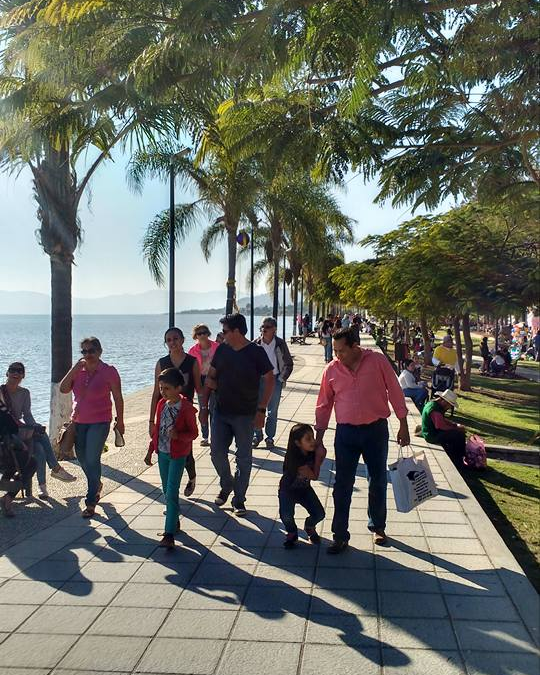
Buena suerte to the Unitarian Universalist Fellowship of Lake Chapala and vaya bien
Reverend Gary Kowalski, Minister, Unitarian Congregation of Taos, NM embarked on a sabbatical leave to Lake Chapala, Mexico with the help of a UUCSJ sabbatical grant.
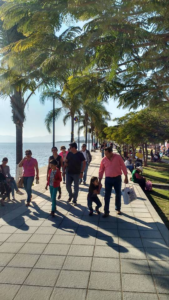 Thirty miles south of Guadalajara, the small town of Ajijic rests on the northern shore of Mexico’s largest body of fresh water, Lake Chapala. Flanked by high mountains, pelicans and herons laze in the shallows, while local families stroll the boardwalk, or malecón. This is home to the Lake Chapala Unitarian Universalist Fellowship, a congregation of U.S. and Canadian expats living abroad, now celebrating their eleventh year since their beginnings in 2006.
Thirty miles south of Guadalajara, the small town of Ajijic rests on the northern shore of Mexico’s largest body of fresh water, Lake Chapala. Flanked by high mountains, pelicans and herons laze in the shallows, while local families stroll the boardwalk, or malecón. This is home to the Lake Chapala Unitarian Universalist Fellowship, a congregation of U.S. and Canadian expats living abroad, now celebrating their eleventh year since their beginnings in 2006.
Besides offering a break from the January winters of northern New Mexico, visiting Lake Chapala represented a chance for me to practice my Spanish. While not quite an immersion–there are too many retired gringos in the area to make speaking Spanish mandatory–I did find many opportunities to chat with locals, and even hired one of the workmen at Casa los Sueños, the old convent where we stayed, to spend an hour conversing with my wife and I each evening.
 Sergio, we learned, had studied at the university to become a lawyer. But the national exams, equivalent to our bar, were prohibitively expensive, so he was doing construction and tile work with his father, fixing up an old bodega on the grounds while living at home and saving money. Mexico, Sergio explained, is not a democracy. Vote buying is rampant in the elections, while business cartels, crime syndicates and government officials are all in bed together. Law can be a dangerous profession, especially criminal practice. These brutal facts were hard to fathom, chatting with him beside the sparkling pool at our B&B, shaded by groves of palm and papaya. But the slums we saw ringing Guadalajara when we traveled in to see the grand Orozco murals in the old historic district were a reminder of Mexico’s underside.
Sergio, we learned, had studied at the university to become a lawyer. But the national exams, equivalent to our bar, were prohibitively expensive, so he was doing construction and tile work with his father, fixing up an old bodega on the grounds while living at home and saving money. Mexico, Sergio explained, is not a democracy. Vote buying is rampant in the elections, while business cartels, crime syndicates and government officials are all in bed together. Law can be a dangerous profession, especially criminal practice. These brutal facts were hard to fathom, chatting with him beside the sparkling pool at our B&B, shaded by groves of palm and papaya. But the slums we saw ringing Guadalajara when we traveled in to see the grand Orozco murals in the old historic district were a reminder of Mexico’s underside.
On the other hand, Ajijic presented a picture of Mexican life that was sheltered and almost idyllic: trim, tidy and traditional. Cobblestone streets were remarkably free of litter. Public art–recounting indigenous legends and honoring national liberators from Hidalgo to Zapata–enlivened the walls along the narrow caminos. Caballeros on horseback twirled lariats. There were a few beggars, but not in any greater numbers than north of the border, and here the ten pesos you press in their hand go farther than money back home.
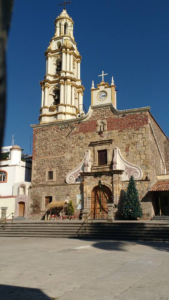 Connecting with Ajijic and the surrounding towns like Jocotepec is one of the primary challenges for the seventy-nine Unitarian Universalists who live here. Almost all are past their working years. Very few speak more than a smattering of español. The majority describe themselves as humanists or atheists in a village where the steeple of the Cathedral of St. Andrew dominates the skyline as Catholicism permeates the culture. Many are part-time residents, traveling periodically back to their English-speaking homes to visit family or satisfy the requirements of six-month tourist visas. All these factors tend to make the Fellowship an island, rather than part of the main.
Connecting with Ajijic and the surrounding towns like Jocotepec is one of the primary challenges for the seventy-nine Unitarian Universalists who live here. Almost all are past their working years. Very few speak more than a smattering of español. The majority describe themselves as humanists or atheists in a village where the steeple of the Cathedral of St. Andrew dominates the skyline as Catholicism permeates the culture. Many are part-time residents, traveling periodically back to their English-speaking homes to visit family or satisfy the requirements of six-month tourist visas. All these factors tend to make the Fellowship an island, rather than part of the main.
During a two-week interval spanning three Sundays in January of 2017, I not only led worship services but conducted a goals-setting workshop for the Lake Chapala Unitarian Universalist Fellowship where members expressed their hopes of developing more meaningful relations with their Mexican neighbors, not merely giving money but building trust and friendship.
Last year, LCUUF contributed to the Centro de Desarrollo, a network of women’s health clinics run by Silvia Flores at two locations, both in Ajijic and in the Tephua section of Chapala. Sra. Flores offers the only access to contraceptives available to women in the area, as well as providing other services like PAP smears. The Lake Chapala Fellowship also supports the Hungry Children of Mezcala Food Program directed by Sra. Tañia Ruiz Martinez, both with cash and with in-kind donations for food baskets. All told, LCUUF gave approximately $2800 US at current exchange rates last year. For perspective, this seemingly modest sum represented 45% of the Fellowship’s budget over the past year. On a percentage basis, few other churches give so much.
 Still, significant numbers of members expressed a desire to do more. Some wanted to introduce Spanish into the liturgy on a weekly basis. Others wanted to learn the language (and a Spanish learners conversation group had formed by the end of my visit). There was acknowledgment that probably very few Mexicans would be interested in joining the Fellowship. But that was not the point. The Anglophones wanted to become more culturally competent, in effect joining into the language, rhythms, heart and soul of Mexican society rather than expecting Mexico to come join them.
Still, significant numbers of members expressed a desire to do more. Some wanted to introduce Spanish into the liturgy on a weekly basis. Others wanted to learn the language (and a Spanish learners conversation group had formed by the end of my visit). There was acknowledgment that probably very few Mexicans would be interested in joining the Fellowship. But that was not the point. The Anglophones wanted to become more culturally competent, in effect joining into the language, rhythms, heart and soul of Mexican society rather than expecting Mexico to come join them.
The advice I gave was encouraging but cautionary. I told them that this would be hard, long term work. I mentioned that there are very few models of vibrant multicultural or multiracial congregations within the UUA. I shared my own experience as a minister in Taos, New Mexico, where our mostly Anglo congregations exists in relative isolation from both the Hispanic and Pueblo peoples who have inhabited the region for generations. I likened it to my own attempts at learning Spanish. It can be done, but only with stick-to-it-iveness and the humility to accept endless corrections while making mistakes along the way.
That said, there is no more worthwhile or rewarding work. Who else but the church should be about the business of breaking down barriers–linguistic, class and social? And what faith is better equipped than our own to articulate a vision of human family across the lines of nation or ethnicity?
Buena suerte to the Unitarian Universalist Fellowship of Lake Chapa and vaya bien. Goodl luck and travel well. I know you can reach whatever destination you choose.

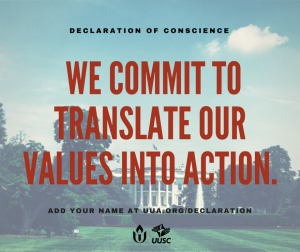
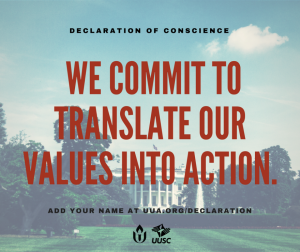




 Heart
Heart Hands
Hands

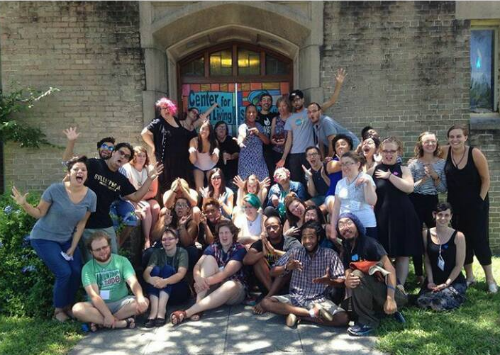 Another participant from the white cohort added, “I believe Grow transformed my work from ‘facebook activism’ into true action. I better understand how organizing for change means matching commitment with a plan for how to do it… If we truly want to show up for the world in the ways our principles commit us to, we need to do white-on-white work to dismantle white supremacy.”
Another participant from the white cohort added, “I believe Grow transformed my work from ‘facebook activism’ into true action. I better understand how organizing for change means matching commitment with a plan for how to do it… If we truly want to show up for the world in the ways our principles commit us to, we need to do white-on-white work to dismantle white supremacy.”